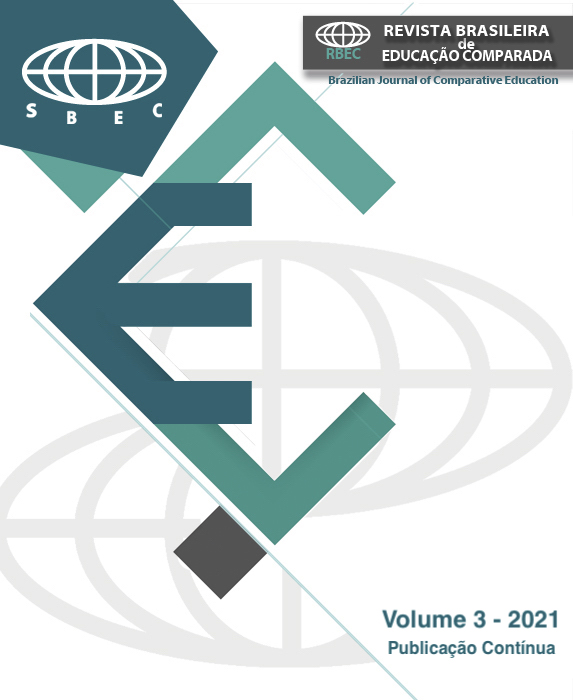Abstract
This article proposes to analyze the options of Professional Education of secondary level that the basic education systems of Sweden and Spain offer for its young people to, in the end, make some comparative considerations with the reality of the Professional Education of secondary level existing in Brazil. We consider it relevant to compare these two medium level Professional Education systems, because the exercise of the comparison shows us the main similarities and differences between such systems and the Brazilian educational reality with regard to medium level Professional Education. The methodology adopted was based on studies and concepts from the area of Comparative and International Education.
References
Bray, M., Adamson, B. & Mason, M. (2015). Modelos diferentes, ênfases diferentes, discernimentos diferentes. In: Bray, M., Adamson, B. & Mason, M. (Orgs.). Pesquisa em educação comparada: abordagens e métodos (pp. 457-476). Brasília: Liber Livro.
Broadfoot, P. (2000). Comparative Education for the 21st century: retrospect and prospect. Comparative Education, 36 (3), 357-371. https://doi.org/10.1080/03050060050129036.
Broadfoot, P. (2012). Tempos de revolução científica? Da educação comparada à ciência comparada de aprendizagem. In: Cowen, R., Kazamias, A. & Unterhalter, E. (Orgs.). Educação comparada: panorama internacional e perspectivas (pp. 717-738). Brasília: UNESCO/CAPES, (2).
Carvalho, E. J. G. (2014). Estudos Comparados em Educação: novos enfoques teórico-metodológicos. Acta Scientiarum, 36 (1), 129-141. https://doi.org/10.4025/actascieduc.v36i1.19012.
Cook, B., Hite, S. & Epstein, E. (1998). Discerning Trends, Contours and Boundaries in Comparative Education: survey of comparativists and their literature. Comparative Education Review, (48), 123-149. Disponível em: https://www.journals.uchicago.edu/doi/10.1086/382619. Acesso em 06 jan. 2021.
Cowen, R. (2000). Comparing Futures or Comparing Pasts? Comparative Education, (36), 333-342.
Franco, M. A. C. (1992). Estudos Comparados em Educação na América Latina: uma discussão teórico-metodológica a partir da questão do outro. In: Puiggrós, A., Bertussi, G. T. & Franco, M. A. C. (Orgs.). Estudos Comparados e Educação na América Latina. São Paulo: Livros do Tatu/Cortez.
Halls, W. D. (1990). Trends and Issues in Comparative Education. In: Halls, W. D. (Org.). Comparative Education: contemporary issues and trends. London: Jessica Kingsley Publishers.
Kaloyannaki, P. & Kazamias, A. (2012). Os primórdios modernistas da educação comparada: o tema protocientífico e administrativo reformista-meliorista. In: Cowen, R., Kazamias, A. & Unterhalter, E. (Orgs.). Educação comparada: panorama internacional e perspectivas. (pp. 25-80). Brasília: UNESCO/CAPES, (1).
Kandel, I. L. (1933). Studies in Comparative Education. Boston: Houghton Mifflin Company.
King, E. (1965). The Purpose of Comparative Education. Comparative Education, 3 (1), 147-159. https://doi.org/10.1080/0305006650010302.
Lima, L. C. V. S. & Afonso, A. J. G. (2002). Democratização, modernização e neoliberalismo. Porto: Edições Afrontamento.
Lourenço Filho, M. B. (2004). Educação Comparada. 3. ed. Brasília: MEC/Inep.
Makuwira, J. & Ninnes, P. (2004). Post-Development Theory and Comparative Education. In: Ninnes, P. & Mehta, S. (Orgs.). Re-Imagining Comparative Education: postfoundational ideas and applications for critical times. New York; London: RoutledgeFalmer.
Phillips, D. & Ochs, K. (2003). Processes of Policy Borrowing in Education: some explanatory and analytical devices. Comparative Education, 39 (4), 451-461. https://doi.org/10.1080/0305006032000162020
Ragin, C. (1987). The Comparative Method: moving beyond qualitative and quantitative strategies. Berkeley: University of California Press.
Sadler, M. (1900). How can we learn anything of practical value from the study of foreign systems of education? Comparative Education Review, 7 (3), 307-314 [Reimpresso em 1964].
Steiner-Khamsi, G. (2004). The Global Politics of Educational Borrowing and Lending. New York: Teachers College Press.
Wikander, L. (2010). The Educational System in Sweden: from a uniform towards a dual model. Pedagogisk Forskning I Uppsala, 158, 5-42.

This work is licensed under a Creative Commons Attribution-NonCommercial-ShareAlike 4.0 International License.
Copyright (c) 2021 Carlos da Fonseca Brandão


